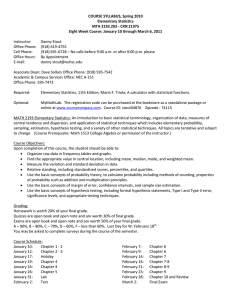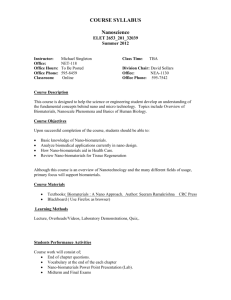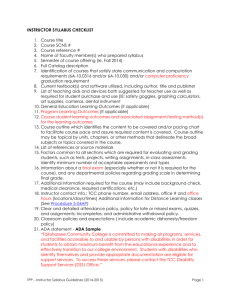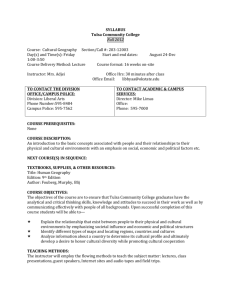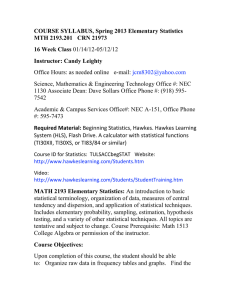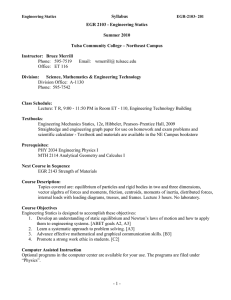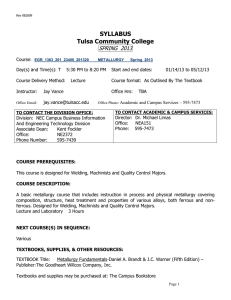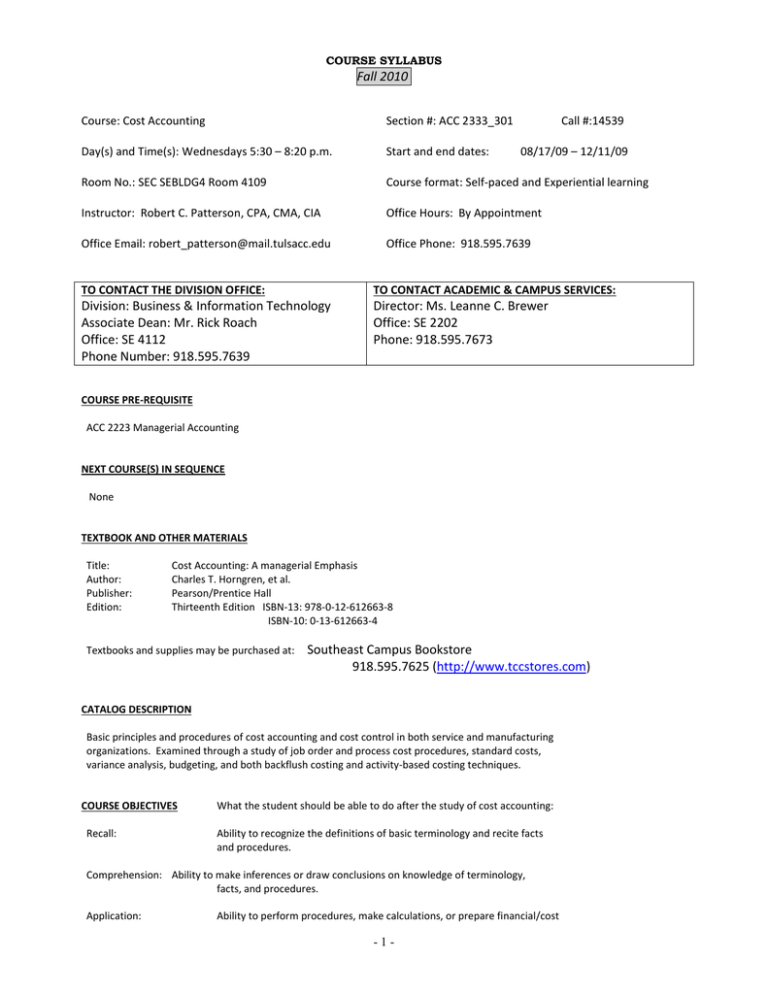
COURSE SYLLABUS
Fall 2010
Course: Cost Accounting
Section #: ACC 2333_301
Call #:14539
Day(s) and Time(s): Wednesdays 5:30 – 8:20 p.m.
Start and end dates:
Room No.: SEC SEBLDG4 Room 4109
Course format: Self-paced and Experiential learning
Instructor: Robert C. Patterson, CPA, CMA, CIA
Office Hours: By Appointment
Office Email: robert_patterson@mail.tulsacc.edu
Office Phone: 918.595.7639
08/17/09 – 12/11/09
TO CONTACT THE DIVISION OFFICE:
TO CONTACT ACADEMIC & CAMPUS SERVICES:
Division: Business & Information Technology
Associate Dean: Mr. Rick Roach
Office: SE 4112
Phone Number: 918.595.7639
Director: Ms. Leanne C. Brewer
Office: SE 2202
Phone: 918.595.7673
COURSE PRE-REQUISITE
ACC 2223 Managerial Accounting
NEXT COURSE(S) IN SEQUENCE
None
TEXTBOOK AND OTHER MATERIALS
Title:
Author:
Publisher:
Edition:
Cost Accounting: A managerial Emphasis
Charles T. Horngren, et al.
Pearson/Prentice Hall
Thirteenth Edition ISBN-13: 978-0-12-612663-8
ISBN-10: 0-13-612663-4
Textbooks and supplies may be purchased at:
Southeast Campus Bookstore
918.595.7625 (http://www.tccstores.com)
CATALOG DESCRIPTION
Basic principles and procedures of cost accounting and cost control in both service and manufacturing
organizations. Examined through a study of job order and process cost procedures, standard costs,
variance analysis, budgeting, and both backflush costing and activity-based costing techniques.
COURSE OBJECTIVES
Recall:
What the student should be able to do after the study of cost accounting:
Ability to recognize the definitions of basic terminology and recite facts
and procedures.
Comprehension: Ability to make inferences or draw conclusions on knowledge of terminology,
facts, and procedures.
Application:
Ability to perform procedures, make calculations, or prepare financial/cost
-1-
reports based upon a straight-forward presentation of the facts of the situation.
Analysis:
Ability to deal with the interrelationships inherent in the facts of the situation.
ACC 2333-301 Cost Accounting
TEACHING METHODS:
Call No. 14539
The class structure will be primarily Lecture and experiential learning through case studies.
EVALUATION TECHNIQUES: The evaluation of each student will be based upon that person’s performance on: (1) two
examinations, (2) homework assignments, and (3) the Case Studies. Cases will be graded on proper punctuation, spelling, and
syntax as well as content.
The grading scale will be as follows:
Formal examinations (2)
Case Study (4)
Homework (12)
Total
100 points each
100 points each
10 points each
720 points
A = 90 – 100% (648 – 720 points)
B = 80 – 89% (576 –647 points)
C = 70 – 79% (504 – 575 points)
D = 60 – 69% (432 –503 points)
F < 60% (less than 432 points)
Check https://bb.tulsacc.edu during the semester for your grades and class averages.
Note:
An “I” or incomplete will not be given in this class.
COURSE WITHDRAWAL: The deadline to withdraw from a course shall not exceed 3/4 the duration of any class. Contact the
Counseling Office at any TCC campus to initiate withdrawal from a course (“W” grade) or to change from Credit to Audit. Check the
TCC Academic Calendar for deadlines. Students who stop participating in the course and fail to withdraw may receive a course
grade of “F,” which may have financial aid consequences for the student.
COMMUNICATIONS:
Email communications: All TCC students receive a designated “MyTCC” email address (ex: jane.doe@mail.tulsacc.edu). All
communications to you about TCC and course assignments will be sent to your MyTCC email address; and you must use
MyTCC email to send email to, and receive email from, the instructor regarding this course.
Inclement Weather: TCC rarely closes. If extreme weather conditions or emergency situations arise, TCC always gives
cancellation notices to radio and television stations. This information is also posted on the TCC website (www.tulsacc.edu).
GENERAL EDUCATION GOALS: General Education courses at TCC ensure that our graduates gain skills, knowledge, and abilities that
comprise a common foundation for their higher education and a backdrop for their work and personal lives. TCC’s General
Education goals are: Critical Thinking, Effective Communication, Engaged Learning, and Technological Proficiency.
CLASSROOM ETIQUETTE: Open and mutually respectful communication of varied opinions, beliefs, and perspectives during
classroom or online discussion encourages the free exchange of ideas that is essential to higher learning and to the ability to learn
from each other. Use of any electronic device is at the discretion of the instructor.
SYLLABUS CHANGES: Occasionally, changes to the syllabus may be necessary. Students will be notified of any changes to the
syllabus in writing.
STUDENTS WITH DISABILITIES: TCC provides accommodations for qualifying students in compliance with the Americans with
Disabilities Act. For information, students may contact the disabled Student Resource Center, 918-595-7115, or the Resource
Center for the Deaf and Hard of Hearing, 918-595-7428V, 918-595-7434TTY.
-2-
ACADEMIC DISHONESTY: Academic dishonesty (cheating) is defined as the deception of others about one’s own work or about the
work of another. Academic dishonesty or misconduct is not condoned or tolerated at campuses within the Tulsa Community
College system. Tulsa Community College adopts a policy delegating certain forms of authority for disciplinary action to the faculty.
Such disciplinary actions delegated to the faculty include, but are not limited to, the dismissal of disrespectful or disorderly students
from classes. In the case of academic dishonesty a faculty member may:
require the student to redo an assignment or test, or require the student to complete a substitute assignment or test;
Record a "zero" for the assignment or test in question;
Recommend to the student that the student withdraw from the class, or administratively withdraw the student from the
class;
Record a grade of "F" for the student at the end of the semester.
Faculty may request that disciplinary action be taken against a student at the administrative level by submitting such request to the
Dean of Student Services.
INSTITUTIONAL STATEMENT: Each student is responsible for being aware of the information contained in the TCC Catalog, TCC
Student Handbook, Student Code of Conduct Policy Handbook, and semester information listed in the class schedule. All
information may be viewed on the TCC website.
ATTENDANCE POLICY:
Attendance is the responsibility of the student. Non-attendance does not constitute formal
withdrawal. Withdrawal is the responsibility of the student. Please discuss any academic matters (i.e., drop or audit) with the
instructor before taking action. I realize that you have a significant investment in both time and money in your education.
LATE ASSIGNMENTS AND MAKE-UP TEST POLICY: Make-up examinations will be given at the Counseling and Testing Center Northeast Campus. Make-up examinations must be completed within two (2) days of the originally scheduled examination (note:
The final examination must be completed by May 2, 2009).
COPYRIGHT NOTICE: Any software described and utilized in this course is furnished under a license or nondisclosure agreement
with various corporations. The software may be used only in accordance with the terms of the agreement. It is against the law to
copy this software on magnetic tape, disk, or any other medium for any purpose.
-3-
ACC 2333-301 Cost Accounting
Call No. 14539
COURSE OUTLINE
Fall 20109
Date
August
September
October
November
December
Readings
Homework Assignments
19
Introduction
26
The Accountant’s Role
2
Introduction to Cost Terms
9
Determining how Costs Behave
Due Date (5:30 p.m.)
16
Cost-Volume-Profit Analysis
23
Cost-Volume-Profit Analysis
30
Job Costing
7
Process Costing
14
Master Budget and Responsibility Accounting
21
Direct-Cost Variances and Management Control
28
Overhead Cost Variances and Management Control
4
Inventory Costing and Capacity Analysis
11
Inventory Costing and Capacity Analysis
18
Decision Making and Relevant Information
25
No Classes
2
Decision Making and Relevant Information
11
Current developments
.This schedule is tentative and subject to change.
-4-


